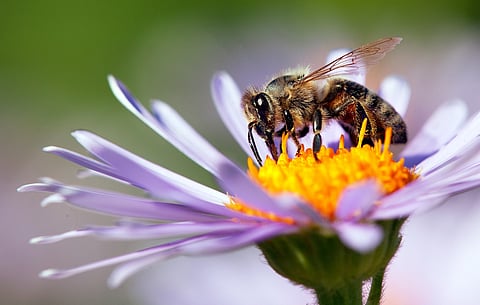
- Destinations
- Experiences
- Stay
- What's new
- Celebrating People
- Responsible Tourism
- CampaignsCampaigns
- SubscribeSubscribe
- Buy Now

Conservation charity houses in the UK are trying to restore natural wildflower corridors in order to preserve and nurture bees. One of them, Buglife, recently announced that it will recreate and restore at least 150,000 hectares of wildflower pathways across England, Wales, Northern Ireland and large areas of Scotland. With the support of local authorities, farmers and other wildlife charity organisations, 'B-Lines' would be created to sustain the flying pollinators and save them from extinction.
As Buglife states, B-Lines are "an imaginative and beautiful solution to the problem of the loss of flowers and pollinators. The B-Lines are a series of &lsquoinsect pathways&rsquo running through our countryside and towns, along which we are restoring and creating a series of wildflower-rich habitat stepping stones. They link existing wildlife areas together, creating a network, like a railway, that will weave across the British landscape. This will provide large areas of brand new habitat benefiting bees and butterflies&ndash but also a host of other wildlife."
And they are calling out to citizens to help map areas.
Home to more than 270 species of bees, the UK was once a thriving abode for these insects. Over the past few decades, millions of hectares of wildflower&ndashrich land has been destroyed due to commercial agriculture, and chemicals used in gardens and parks to keep 'pests' out.
And bees, long with other insects, are at the edge of extinction.
Why should that bother you Well, everytihng in nature is connected. The extinction of bees will affect the pollination of plants, which will affect many animal species, availability of fuels, clothing and of course, human life. Because insects are the primary pollinators on the planet
Bees act as catalysts in pollination as they visit a large variety of flowers and plants. They carry large volumes of pollen on their bodies. Farmers rely on them to increase growth and fertility of many plant species.
With vast tracts of natural land disappearing, bees and other winged insects cannot travel around. They are practically confined to isolated, small areas which are still intact.
The B-Lines will hopefully solve the issue. They are being designed as 3 km wide strategically planned and mapped networks of existing wildflower corridors spread all over UK. Stretching from the country&rsquos coast to the countryside, towns and cities, the criss-crossing networks covers a total of around 48,000 sq km of England. Along with this, roadside flower corridors are also being created to make them nesting hubs for bees.
In a report by the Wildlife Trust of UK a major threat to the bee population is the excessive use of pesticides. The Trust has directed to slash the use of such chemicals by half. Calling the insects &ldquocanaries in the coal mine&rdquo in the natural world, the report said that it is extremely crucial to restore and preserve them. &ldquoIf we get it right for insects we get it right for everything else,&rdquo said Prof Dave Goulson, at the University of Sussex and lead author of the report.
